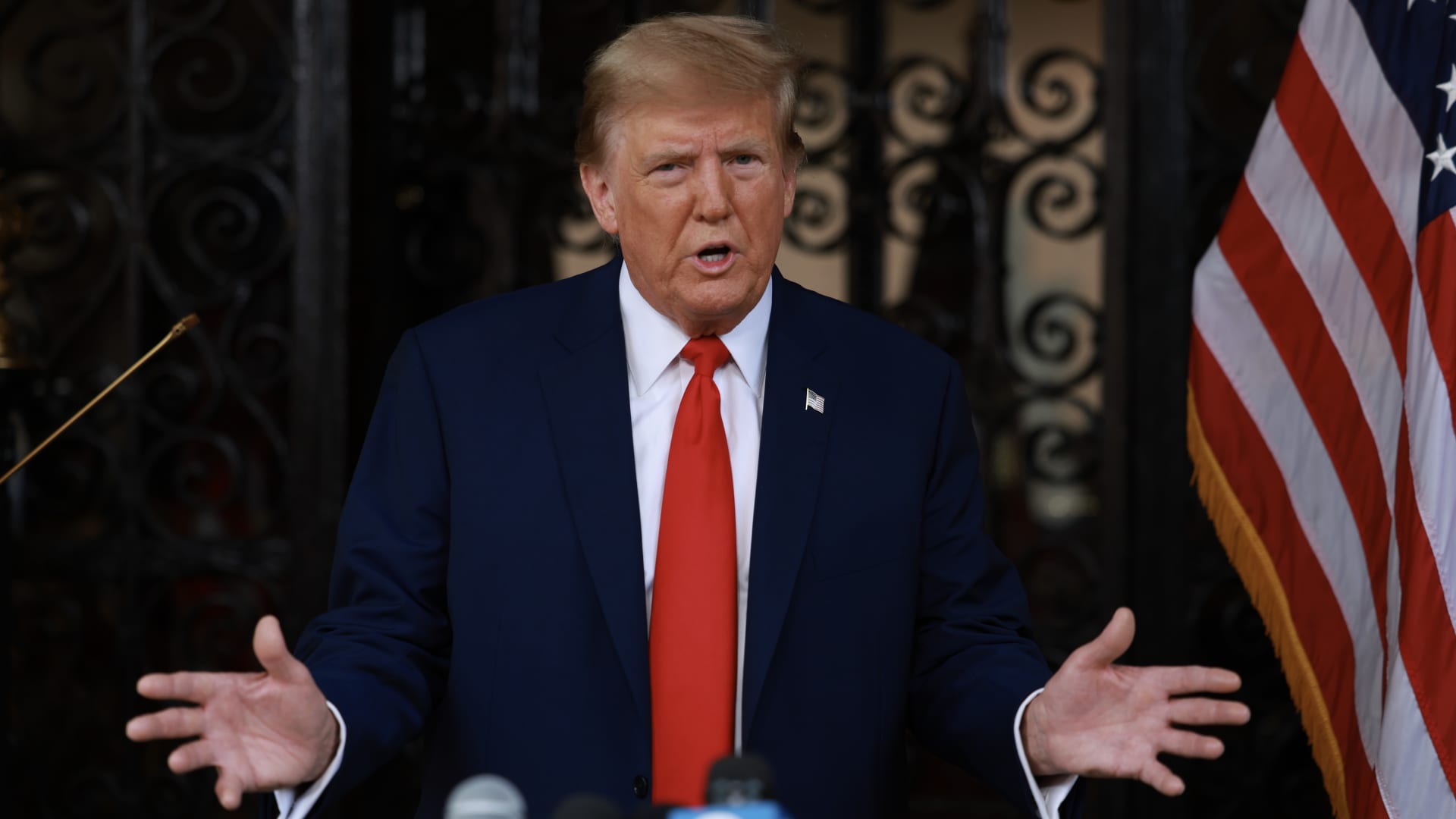Former U.S. President Donald Trump speaks during a press conference held at Mar-a-Lago on February 08, 2024 in Palm Beach, Florida.
Joe Raedle | Getty Images
Lawyers for Donald Trump on Monday asked the Supreme Court to temporarily halt a ruling rejecting his claim that he is immune from being criminally charged with trying to overturn his loss in the 2020 presidential election.
“Without immunity from criminal prosecution, the Presidency as we know it will cease to exist,” Trump’s attorneys wrote in an application for the Supreme Court to pause the ruling from a lower court.
A three-judge panel in the federal appeals court in Washington, D.C., last Tuesday unanimously denied Trump’s argument that he cannot be prosecuted for any official acts he performed as president.
That ruling would end Trump’s effort to throw out special counsel Jack Smith’s case and restart proceedings in federal district court in D.C.
But the panel withheld its 57-page ruling from taking effect until Monday, giving Trump’s lawyers time to ask the Supreme Court to pause the case while they file an appeal to the nation’s highest court.
In applying for that pause Monday afternoon, the defense lawyers argued that the high court should “forestall, once again, an unprecedented and unacceptable departure from ordinary appellate procedures and allow President Trump’s claim of immunity to be decided in the ordinary course of justice.”
Trump’s immunity claim “presents a novel, complex, and momentous question that warrants careful consideration on appeal,” his attorneys wrote.
Allowing a former president to face criminal prosecution for official acts will usher in “destructive cycles of recrimination,” and the threat of future indictment “will hang like a millstone around every future President’s neck,” they argued.
They also argued that the appeals court’s order will threaten “immediate irreparable injury to the First Amendment interests” of Trump and millions of voters, because it will hasten a trial that will “inevitably disrupt President Trump’s ability to campaign against President [Joe] Biden.”
Trump has sought to delay his multiple criminal and civil cases as he runs for the Republican presidential nomination. He is currently the GOP’s clear front-runner, setting up a likely rematch with Biden.
Trump’s application for a stay keeps the case on hold, at least until the Supreme Court issues a decision on whether or not to grant the request. An individual justice can make that decision.
The nine-member Supreme Court includes three justices who were appointed under Trump, but Chief Justice John Roberts, who was nominated by former President George W. Bush, is assigned to handle matters coming from D.C.
Last week’s ruling in the U.S. Court of Appeals for the District of Columbia Circuit upheld U.S. District Judge Tanya Chutkan’s prior decision denying Trump’s claim of “absolute” presidential immunity.
Protesters demonstrate outside of the U.S. Supreme Court on February 8, 2024 in Washington, DC.
Julia Nikhinson | Getty Images
“For the purpose of this criminal case, former President Trump has become citizen Trump, with all of the defenses of any other criminal defendant,” read the ruling from appellate Judges Karen LeCraft Henderson, Michelle Childs and Florence Pan.
“But any executive immunity that may have protected him while he served as President no longer protects him against this prosecution,” they ruled.
Trump’s attorneys have argued that the Constitution’s separation-of-powers doctrine prevents the courts from reviewing a president’s official acts. They also argued that the same doctrine requires immunity to avoid hampering the functions of the Executive Branch.
The appeals court rejected those arguments.
“At bottom, former President Trump’s stance would collapse our system of separated powers by placing the President beyond the reach of all three Branches,” the judges ruled.
They also dismissed as “irrational” Trump’s contention that the Constitution only permits charges against a former president if they are first impeached and convicted by Congress.
Trump was impeached in the House twice while in office, but the Senate on both occasions voted to acquit him. A majority of senators voted to convict Trump in his second impeachment trial on a charge of inciting the Jan. 6, 2021, insurrection at the U.S. Capitol, but the vote fell short of the two-thirds requirement.
Smith in the D.C. election case is prosecuting Trump on four criminal counts, including conspiracy to defraud the U.S. by trying to reverse the 2020 results and conspiracy to obstruct Congress from certifying Biden’s victory on Jan. 6, 2021.
Trump has pleaded not guilty to those charges and dozens more in three other active criminal cases, which he claims are part of a conspiracy by the Biden administration to damage him politically.
— CNBC’s Dan Mangan contributed to this report.

